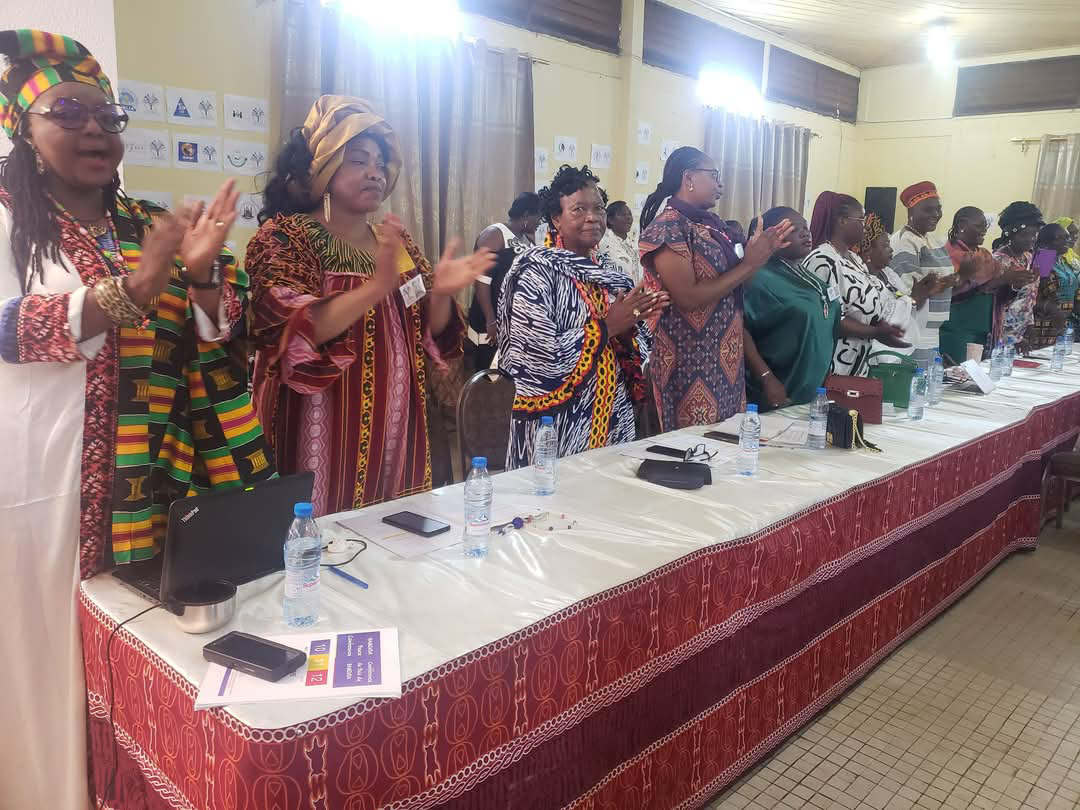In a country long scarred by armed conflict and political tension, the women of Cameroon have once again taken a resolute stand for peace this time in Bamenda, a city symbolic of both resistance and unresolved pain. Organised by the National Women's Convention for Peace in Cameroon from April 10-12, 2025, the Bamenda Peace Conference which assembled Representatives from 77 organisations, is the third of its kind following similar gatherings in Limbe and Maroua. However, for the women who sat around the table this time, it was about more than another meeting, it was about follow through
“We are not defined by our titles or positions, but united by a common vision; a vision of peace, healing, and lasting harmony for our region,” said Munteh Florence Chea, North West Regional Coordinator of the National Women's for Peace in Cameroon, in her welcome address.
She declared the event not simply as a conference, but a movement “where women rise not only to speak, but to act.”
Munteh Florence, NW Regional Coordinator of the National Women's Convention for Peace in Cameroon addressing the opening ceremony
The conference opened to a sombre tone as participants arrived amidst reports of a fatal shooting at the city’s Hospital Roundabout, an unsettling reminder of the very urgency for peace that brought them together. The women came determined, carrying not only personal stories and regional reports, but a demand for accountability from government, traditional authorities, and communities alike.
Christian Klatt, Resident Representative of the Friedrich Ebert Foundation, which supports the initiative, praised the consistency and strength of the women’s movement.
Christian Klatt, Resident Representative FES Cameroon addressing opening ceremony of the Bamenda Peace Conference
“It is possible for women to be a driving force for peace in Cameroon. They have proven so in the past through their activities,” he said acknowledging the credibility the movement has earned nationally and internationally.
Speaking to Hilltopvoices after the opening ceremony via a messaging platform, Munteh Florence outlined key expectations from local and national authorities.
“What I expect from local authorities, first, with regards to women’s peacebuilding initiatives, is engagement. Local authorities hold a lot of power because they understand the local realities... For peacebuilding to be effective and sustainable, local authorities need to be more engaging, especially regarding community dialogue and cohesion.” she explained
She warned that unless Cameroonians begin talking to each other honestly face-to-face and across divisions, peace will remain elusive.
“Until then, we might still be hanging in the air... Local authorities are the principal actors when it comes to grassroots realities, and every person must be engaged in the process.” she said
As for government, Munteh was unequivocal
“The government has the power, the resources, and the means to continuously foster dialogue in every possible way. What we need most is good faith and intentionality in the approach they take in responding and creating possibilities for resolving the crisis.” she added
Beyond the plenary and breakout sessions, participants fanned out to institutions in Bamenda. From schools and hospitals to the Central Prison, Disarmament, Demobilisation and Reintegration (DDR) center, the Central Mosque, churches and military facilities.
“This was not a coincidence. It was an intentional action. We wanted to create a platform where every actor important in the peacebuilding process is aware of the role they have to play in restoring peace to our region.” Munter clarified
According to her, the outcomes of the conference will not vanish into dusty archives. Monitoring will be grounded in responses from those institutions visited.
“We are going to measure our success and the sustainability of these activities based on the responses we will continuously get from the field,” she assured.
The voices from across Cameroon were diverse yet aligned. Reports from the Extreme North, North, Adamawa, Centre, West, Littoral, East, South West regions raised alarms over rising gender-based violence. Fanny Bessem from the South West stressed collaboration:
“Real power lies with the people. Only a few places in Manyu don not have ghost towns and it’s because communities fought for it.”
The government’s representative, Secretary General at the North West Governor’s Office, reaffirmed state commitment to security and urged the women to continue playing their role as educators especially to those who have taken up arms. In a show of political goodwill, the SG reassured the women of government commitment to protecting all citizens, particularly in the lead-up to elections.
Muma Yvonne, one of the founding visionaries of the Convention, in response reminded all present that child upbringing must not be a burden left solely to women.
“It is a partnership between men and women,” she said.
The women of Cameroon have spoken loudly and clearly. Their peace agenda is deliberate, inclusive, and structured. And as Munteh Florence insists, “local women have a critical role to play, because they are at the heart of the effects of the crisis… If they understand their role, and if they are empowered, they will be among the strongest drivers of sustainable peace.”
By Bakah Derick
Email: hilltopvoicesnewspaper@gmail.com
Tel: 6 94 71 85 77
Tags
Bamenda
City News
Culture
Education
Humanitarian Women
Lifestyle
Local Development
Local News
News
Peacebuilding
Politics
Religion








